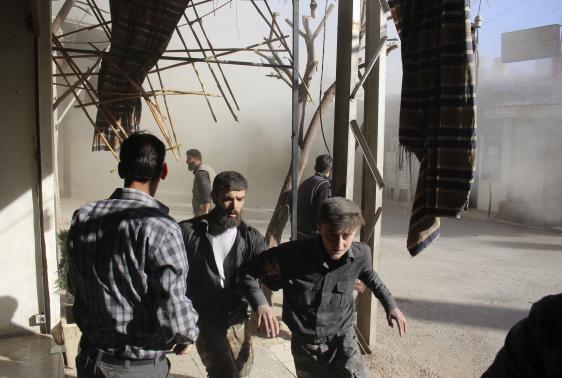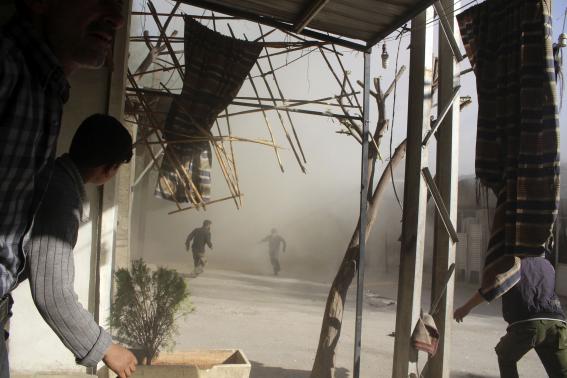www.aljazeerah.info
News, March 2014
Archives
Mission & Name
Conflict Terminology
Editorials
Gaza Holocaust
Gulf War
Isdood
Islam
News
News Photos
Opinion Editorials
US Foreign Policy (Dr. El-Najjar's Articles)
www.aljazeerah.info
|
Editorial Note: The following news reports are summaries from original sources. They may also include corrections of Arabic names and political terminology. Comments are in parentheses. |
Syrian Forces and Rebels Battle for Border Post of Kasar, Near Turkish Mediterranean Border
 |
 |
| Site of Syrian government forces shelling of Eastern Ghouta, March 22, 2014 | Site of Syrian government forces shelling of Eastern Ghouta, March 22, 2014 |
Rebels battle for Syria border post near Mediterranean
Sat Mar 22, 2014 11:29am EDT
(Reuters) -
Syrian fighters battled President Bashar al-Assad's forces for control of a border crossing with Turkey close to the Mediterranean on Saturday, part of an offensive aimed at opening up a rebel link to the sea.
They said heavy clashes continued around Kasab crossing and a nearby village of the same name - both about 5 miles from the coast - a day after rebels launched their assault.
Assad's forces have already lost control of most border crossings with Turkey during the three year civil war but had held on to Kasab, gateway to the coastal province of Latakia which has remained an Assad stronghold.
In recent months, the president's forces have also made gains around the capital Damascus and the border region with Lebanon, seizing two rebel bases in the last week.
Syrian authorities accused Turkey of helping the fighters launch their attack on Kasab from Turkish territory, saying Ankara's army "provided cover for this terrorist attack" on the wooded and hilly border region.
Turkey and Gulf Arab states have backed the mainly Sunni Muslim rebels against Assad, who is from the minority Alawite sect and is supported by Iran and Shi'ite fighters from Iraq and the Lebanese militia Hezbollah.
The attack on Kasab was carried out by fighters from the Nusra Front, al Qaeda's Syrian operation, and the Islamist Ahrar al-Sham brigade, part of the Islamic Front alliance.
The Islamic Front said its fighters repelled advances by the army and pro-Assad militia to retake the "liberated" crossing, posting a video of khaki-clad fighters wearing red armbands and firing at what it said were the government forces.
The Britain-based Syrian Observatory for Human Rights, which monitors the Syrian conflict, said the rebels had "in principle" taken control of the crossing itself, although fighting continued in the area and Assad's forces were still in control of Kasab village, barely a mile (two km) to the northwest.
"The rebels are trying to open a corridor to the sea, so they can get weapons shipments," said Rami Abdelrahman, the Observatory's director. He said 13 rebels, some of them foreigners, were killed on Friday along with 16 soldiers and pro-Assad militia fighters. Five civilians also died.
FEARS OF PARTITION
More than 140,000 people have been killed in the conflict, while 2.5 million refugees have fled to neighboring countries and millions more need humanitarian aid.
With the erosion of state power, Syria has also become increasingly fragmented, with the Assad holding the center of the country, rebels controlling much of the north and east, and Kurds taking steps towards autonomy in the northeast.
That prospect has alarmed many of Syria's neighbors.
"All the scenarios of partition in Syria will have disastrous results for Syria and the region," Jordan's King Abdullah told Al-Hayat newspaper in an interview published on Saturday.
"This will unleash endless waves of violence, hate and extremism which threaten to deepen civil war and sectarian fighting," the monarch said, warning it would spread across borders and threaten regional stability.
The turmoil in Syria has already spilled over into neighboring Lebanon, where car bombs have struck Beirut and other cities. Eleven people were killed on Friday in the northern city of Tripoli.
Islamist fighters in Iraq's western province of Anbar, which borders eastern Syria, have also been battling Prime Minister Nuri al-Maliki's forces.
On Saturday, Syrian state media said an army unit east of Damascus had ambushed a group of Nusra Front fighters who had infiltrated from Jordan. Syrian television showed the bodies of around a dozen men lying on the ground, some with weapons.
(Reporting by Dominic Evans; Editing by Tom Heneghan)
Fair Use Notice
This site contains copyrighted material the
use of which has not always been specifically authorized by the copyright
owner. We are making such material available in our efforts to advance
understanding of environmental, political, human rights, economic,
democracy, scientific, and social justice issues, etc. We believe this
constitutes a 'fair use' of any such copyrighted material as provided for
in section 107 of the US Copyright Law. In accordance with Title 17 U.S.C.
Section 107, the material on this site is
distributed without profit to those
who have expressed a prior interest in receiving the included information
for research and educational purposes. For more information go to: http://www.law.cornell.edu/uscode/17/107.shtml.
If you wish to use copyrighted material from this site for purposes of
your own that go beyond 'fair use', you must obtain permission from the
copyright owner.
|
|
|
|
||
|
||||||


